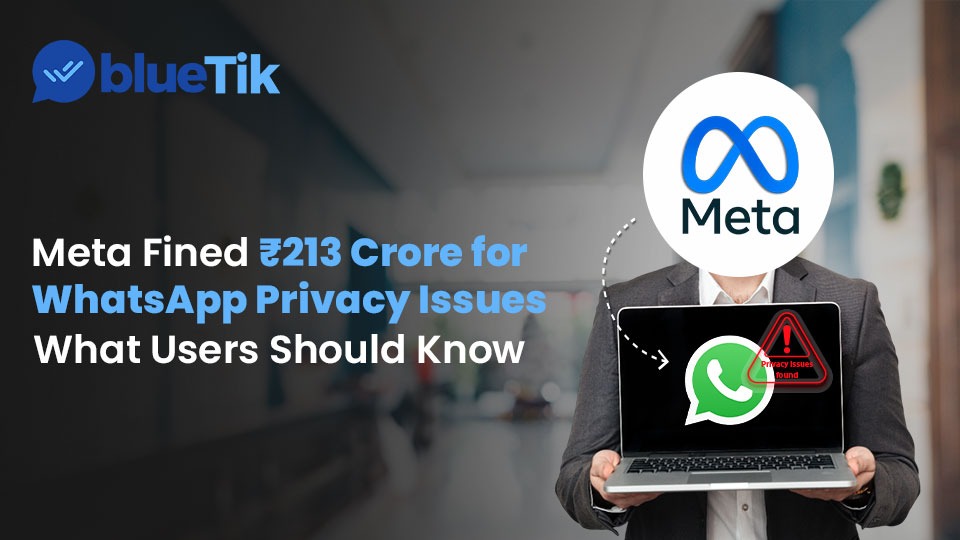The Competition Commission of India (CCI) has fined WhatsApp ₹213.14 crore for abusing its dominant market position through its 2021 privacy policy update. In addition, the CCI has ordered WhatsApp to implement significant changes within the next three months to address its anti-competitive practices. Here’s everything users need to know about the ruling and its implications.
Background: The Controversial Privacy Policy Update
In January 2021, WhatsApp users in India began receiving in-app notifications asking them to agree to a revised privacy policy. The main update allowed businesses to use Facebook-hosted services to manage customer communications on WhatsApp. This meant that messages sent to businesses could be stored and managed by Facebook.
While WhatsApp assured users that these chats would not be used to display personalized ads, it highlighted that businesses could independently utilize the chats for advertising purposes. Additionally, the update disclosed the extent of metadata WhatsApp collects, such as battery levels and signal strength.
What caused further outrage was WhatsApp’s announcement that users who did not accept the updated policy would lose access to the platform. Following backlash, WhatsApp extended the deadline to May 2021 but faced scrutiny from various regulatory bodies, including the CCI.
How Did the CCI Get Involved?
The CCI launched a probe in March 2021, taking suo moto cognizance of the matter. The investigation was based on publicly available information and complaints from individuals and digital rights groups, such as the Internet Freedom Foundation (IFF).
The CCI identified potential violations of Section 4 of the Competition Act, 2002, which addresses the abuse of a dominant position in the market. According to the IFF, WhatsApp’s privacy policy imposed unfair and discriminatory terms on users by not offering them effective consent.
WhatsApp and Meta challenged the investigation in the Delhi High Court and later in the Supreme Court, but both courts allowed the probe to continue. The Supreme Court also directed WhatsApp to publish newspaper advertisements informing users that they were not required to accept the updated policy to continue using the app.
Why Was Meta Fined?
The CCI determined that WhatsApp holds a dominant position in India’s market for over-the-top (OTT) messaging apps. Factors supporting this conclusion included WhatsApp’s extensive user base, network effects, and lack of effective competition from alternatives like Signal or Telegram.
While market dominance itself is not illegal, the CCI found that WhatsApp had abused its position by:
- Forcing Users to Accept the Policy: Users who did not agree to the update were told they would lose access to the platform.
- Data Sharing with Meta: WhatsApp shared user data with other Meta subsidiaries, creating barriers that prevented competitors from accessing similar user data for targeted advertising.
What Changes Has the CCI Ordered?
To address these concerns, the CCI has imposed the following mandates on WhatsApp:
- Data Sharing Restrictions: WhatsApp cannot share user data with other Meta-owned services for the next five years.
- User Consent Options: From 2029, users must be given the option to opt out of data sharing through an in-app notification.
- Enhanced User Control: WhatsApp must create a dedicated tab in its Settings menu allowing users to review and modify their data-sharing preferences.
Meta’s Response
Meta, the parent company of WhatsApp, has stated its disagreement with the CCI’s findings and plans to appeal the decision. In a statement, the company reiterated that the 2021 privacy policy update did not alter the privacy of personal messages and was presented as a choice to users. It also emphasized that no users lost access to the platform because of the policy update.
What This Means for Users
The CCI’s ruling is a significant step in ensuring that companies do not misuse their dominant positions to impose unfair terms on users. For WhatsApp users in India, the decision could lead to greater transparency and control over how their data is used.
While Meta is likely to challenge the ruling, the CCI’s directives emphasize the importance of informed user consent and accountability in the digital age. For now, WhatsApp users can rest assured that their data will not be shared with other Meta services without clear options to opt out.
This case serves as a reminder of the growing need for regulators to oversee how tech companies manage user data and ensure fair competition in digital markets.

